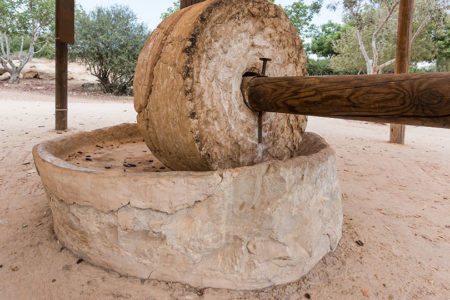The Judgment of the Nations
When the Treatment of Jews Determines Destinies
As long as I don’t hurt anyone, whatever I do is just fine.” Such proverbs abound in our day. Morality is defined by personal opinions. Courts pass laws based on majority vote or popular consensus. Criminals receive lenient treatment. Entertainment pushes the traditional boundaries of acceptability. Yet inside of each human being resides a small voice. The conscience whispers approval or condemnation of each person’s attitudes and actions. How remarkable that God has planted this miniature version of His future judgment seat within the heart of each person! No one will be taken by surprise when the Lord God takes His place as the final judge.
One phase of God’s judgment will occur when our Lord Jesus returns to the earth at the end of the Tribulation period. His glorious Second Coming will put an end to Gentile rule. In His own words, “the times of the Gentiles [will] be fulfilled” (Lk. 21:24). The Prophet Daniel predicted this great reversal of history as well. God’s kingdom “shall break in pieces and consume all these kingdoms” (Dan. 2:44). Before the beginning of that one-thousand-year reign, Christ will call into His hall of justice every Gentile who survives the Tribulation period. This judgment will determine which Gentiles are fit to enter the Millennial Kingdom. The major passages dealing with this important event are Joel 3 and Matthew 25.
When Will This Judgment Take Place?
The Prophet Joel declares that a judgment of the nations will occur when God restores the fortunes of Judah and Jerusalem (3:1). This future time will be marked by Judah’s return from captivity and settlement in the land of Israel. Although a small group of Jews returned from the 70-year Babylonian captivity in 538 B.C., this end-time return will be from all over the earth. Other prophets confirm that Israel will be regathered to its ancient homeland in the final days of history (i.e., Isa. 11:11; Jer. 30:3; Ezek. 34:13; Zech. 10:10).
Jesus’ declared, “When the Son of man shall come in his glory…then shall he sit upon the throne of his glory” (Mt. 25:31). This is a clear description of our Lord’s second advent in power and great glory at the end of the Tribulation period.
Who Will Be Judged?
Most people imagine that God will judge them after they die. And for most people, that will be true. However, the judgment of the nations is a judgment of the living. Joel states that God will gather all the nations to be judged (3:2). Jesus said that “before him shall be gathered all the nations” (Mt. 25:32). This event is called the judgment of the nations to distinguish it from God’s other judgments. But it must not be understood as a judgment of national groups of people. The word nations implies Gentiles, and the context indicates that individuals, not groups, will be evaluated.
The effects of the Tribulation will cause the deaths of millions of people on the earth. A host of armed forces will die in the final campaign of Armageddon, when the Lord Jesus Christ will conquer His enemies. However, there will be survivors. That is why there is no resurrection mentioned here, as in the Great White Throne Judgment (Rev. 20:11–15). Those who remain alive after the horrible years of God’s Tribulation wrath will meet the Son of God face to face. He will determine who enters His earthly Millennial Kingdom.
Where Will This Judgment Take Place?
Joel predicts that it will occur in “the Valley of Jehoshaphat” (3:2). Because there has never been a valley in Israel with this name, it is probably symbolic, inasmuch as the name Jehoshaphat means The LORD judges. Later in this passage it is further described by another symbolic name, “the valley of decision” (3:14). This future location may well be the valley created when the Messiah Jesus returns and splits apart the Mount of Olives (Zech. 14:4). The area east of the holy city near the Kidron Valley may well be the location. A large area will be needed to contain the many Gentiles as they prepare for the Messiah’s judgment when He reigns in Jerusalem.
The name Jehoshaphat also recalls the king by that name. He experienced a great military victory when Judah’s enemies turned on themselves. The Lord conquered His people’s enemies by engineering their mutual destruction (2 Chr. 20:20–23). The Lord will again bring judgment on His enemies and vindicate His people.
On What Criteria Will This Judgment Be Based?
Once the Gentiles who survive the Tribulation gather at the throne of King Jesus, their guilt or innocence will be made clear. No attorney will be permitted to intercede. Jesus will become the prosecutor, the judge, and the jury. Only this one who knows all things—actions as well as motives—will disclose the truth.
Jesus will separate these people as a shepherd divides the sheep from the goats. After the separation is completed, Jesus will reveal the reason for the division: their treatment of Himself. When both groups hear this, they will question Him. The righteous will ask, “Lord, when saw we thee hungry, and fed thee; or thirsty, and gave thee drink? When saw we thee a stranger, and took thee in; or naked, and clothed thee? Or when saw we thee sick, or in prison, and came unto thee?” (Mt. 25:37–39). How could Jesus evaluate these Gentiles when they had never met Him on the earth? His response is a shock. “Inasmuch as ye have done it unto one of the least of these my brethren, ye have done it unto me” (Mt. 25:40).
Who are the people whom Jesus calls “my brethren”? Because the context indicates the time period to be immediately after the Tribulation, they would seem to be a third group, in addition to the Gentile sheep and goats. These “brethren” of Jesus will be the faithful Jewish remnant (the 144,000) who will have survived the Tribulation period, having proclaimed the gospel during those dark days (Rev. 7:1–8). These Jewish evangelists will be marked for severe persecution. Only fellow believers in Jesus will dare to provide for their physical needs (food, clothing, housing) and even visit them in prison. The destiny of Gentiles who survive the Tribulation will be based on their treatment of Jewish believers during that period.
This concept may seem to imply that salvation is based on good works. However, nowhere in Scripture is such a theory affirmed. People are “justified by faith apart from the deeds of the law” (Rom. 3:28). Because the faith that brings salvation comes through God’s free grace, it is no surprise that believers are, in fact, created and destined for good works (Eph. 2:8–10). Believers are concerned for the physical welfare of other Christians. “If a brother or sister be naked, and destitute of daily food, And one of you say unto them, Depart in peace, be ye warmed and filled; notwithstanding, ye give them not those things which are needful to the body, what doth it profit? Even so faith, if it hath not works, is dead, being alone” (Jas. 2:15–17). Anti-Semitism will run rampant during the Tribulation. Apart from genuine faith in the Jewish Messiah, no Gentile would dare befriend a Jew during that time. True Christianity and anti-Semitism are as opposite as righteousness and sin.
Because true Gentile faith will be manifested in kindness toward Jewish believers during the Tribulation, it follows that a lack of true faith will result in persecution of Jewish believers. Joel describes the oppression of God’s chosen people in more graphic terms. The wicked Gentiles will scatter the Jewish people from the land of Israel and divide up their homeland. Their inhumanity will be shown in slave trade. During the dreadful conditions of the Tribulation, children will be bartered for sexual pleasure or simply for a drink of wine (Joel 3:3). Here are child abuse and anti-Semitism gone wild. God will condemn these Gentiles for violating “my people” and “my land” (Joel 3:2).
What Will Be The Results of This Judgment?
Jesus said that the righteous will “inherit the kingdom” (Mt. 25:34) as well as enjoy “life eternal” (Mt. 25:46). These righteous Gentile believers will enter the earthly kingdom in their natural bodies. This first generation of Gentiles, joined by believing Jews, will begin to populate the Millennial earth with children. They will form the Gentile nations who will worship God in Jerusalem, as predicted in passages such as the following: “Yea, many peoples and strong nations shall come to seek the Lord of hosts in Jerusalem, and to pray before the Lord. Thus saith the Lord of hosts: In those days it shall come to pass that ten men shall take hold out of all languages of the nations, even shall take hold of the skirt of him that is a Jew, saying, We will go with you; for we have heard that God is with you” (Zech. 8:22–23). “At that time they shall call Jerusalem the throne of the Lord, and all the nations shall be gathered unto it, to the name of the Lord, to Jerusalem” (Jer. 3:17).
The goats—those accursed ones who persecuted Jewish believers—will be condemned to the same eternal punishment prepared for the Devil and his demons. This is not merely a time of punishment that will have an end, as a fire that consumes its fuel. Just the opposite is demanded by Jesus’ words. The same word—eternal—describes both the bliss of the believers and the condemnation of the cursed.
Long ago God promised Abram, “I will bless them that bless thee, and curse him that curseth thee” (Gen. 12:3). These words will find their fulfillment in the judgment of the nations. Gentiles who bless the Jewish believers of the coming Tribulation period will themselves be blessed. Sadly, the opposite is tragically true. Gentiles who curse Jewish believers during that time will themselves be cursed. The Prophet Zechariah repeated the same warning to the nations who plundered Israel: “he that toucheth you [Israel] toucheth the apple of his eye” (Zech. 2:8).







